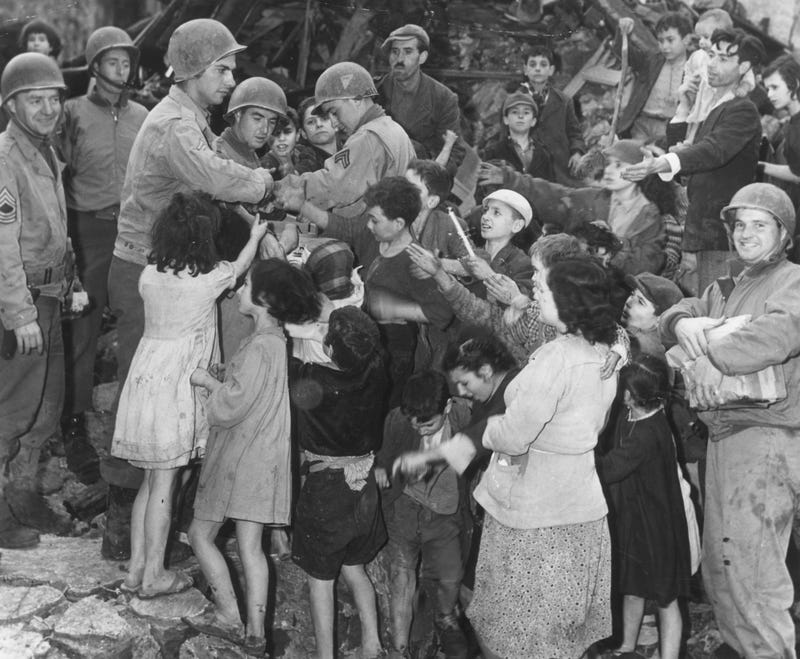
Christmas in 1945 signaled the beginning of the end of the horror and trauma experienced during World War II. Many American soldiers were rushed back home as a part of a massive logistics undertaking known as Operation Magic Carpet, but others would spend Christmas in Germany, France and Japan.
In Germany, war weary and often orphaned children were given candy by American soldiers.
"Pockets which a year ago were crammed with grenades and ammunition today bulged with candy bars, chocolates, and loot picked up in the long campaign across France, Belgium, Holland, and Germany," the Salt Lake Tribune reported.
In celebrating Christmas with the Germans, the Tribune reported that, "the inherent American characteristic of fair play and forgiveness and sympathy surged forth."
"Christmas 1945" by Matthew Litt describes the scene for service members in India, who had to have a tree shipped all the way from the Himalayas to serve as a Christmas tree. It was then decorated with, "popcorn dipped in dye, shiny tin cans, and homemade decorations in the shape of snowflakes."
In Japan, the Army imported 1,500,000 pounds of turkey and 7,475 pounds of dehydrated cranberry sauce for Christmas dinner. Pacific Stars and Stripes wrote, "...today finds our troops in Tokyo, not as warriors bent on killing but as soldiers on a peaceful mission, helping to guarantee a misguided people their rights-and firmly showing them that ruthless aggression, barbarism, and atrocities are things against which peace-loving people will always fight."
Service members stationed in France were gifted a stipend by President De Gaulle which resulted in a spending spree. Soldiers mailed home, "lamps, paintings, etchings, sculptures, books, toys and small furniture with regularity," Litt writes. Perfume was the most prized gift, but the French government set a national limit of one bottle per month.
Troops stationed in China had to improvise more than most. In search of Christmas turkeys, Army quartermasters learned of an island where there existed a turkey farm but the owner inflated his price to $4 per turkey so they opted for chicken dinners instead. As in Germany, American troops tried to celebrate the holiday with local orphans, "with many a friendly soldier becoming 'daddy' for a day to a wide-eyed, happy Chinese orphan," the Herald Tribune reported.
"The U.S. Navy held parties on ships for Shanghai orphans," Litt writes. "U.S. soldiers and sailors did the same for war distressed children in India, China, the Philippines, Bulgaria, Romania, Austria, Iceland, and throughout the South Pacific."
Want to get more connected to the stories and resources Connecting Vets has to offer? Click here to sign up for our weekly newsletter. Reach Jack Murphy: jack@connectingvets.com or @JackMurphyRGR.
